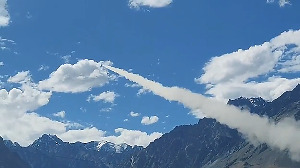It would be churlish to begrudge Obama his day in the sun, which comes on his inauguration on January 20, and there is no denying that it is an historic occasion when a black man steps into the White House, especially if you remember Jim Crow and Bull Connor and Rosa Parks, all iconic in the apartheid known as segregation. To be honest, I did not think Americans were yet ready to elect a black man or a woman as president, and I stand corrected.
But I am not as overwhelmed as many are with this fine show of egalitarianism, because humble India has long been the exemplar in recognising and emancipating the under-privileged or outsiders. With India's record of raising various Harijans to significant posts like President and Chief Justice, a woman to the prime minister-ship, and so on, India's record in this regard is superior to America's. India also has an incomparable record of being the refuge of last resort for the 'huddled masses' of the world.
Nevertheless, Obama's symbolic role is significant. A news magazine conducted a survey and found that its subscribers worldwide would have chosen Obama over McCain, if they could vote, by a large margin. There are expectations about Obama not only among his countrymen, but among foreigners as well: there is something, apparently, in his message of a clean break with the past that is appealing. Besides, Dubya Bush did have a knack of annoying a lot of people, and everyone wants someone -- anyone -- else in power.
I have personally never supported Obama for three reasons: One, that I am suspicious of the Democratic Party in the US; two, that I fear that Obama is all style and no substance; and three, that I believe his war-cry of 'change!' is no more than election rhetoric, because there is no way anybody is going to turn the battleship that is America except very, very slowly. I see no reason to change these views.
Not that I think the Republican Party is any great shakes: Its core constituency includes unreconstructed racists and Bible-thumping fundamentalists. But I find the Democrats more insidious because they mouth all these liberal platitudes, but at the end of the day they are dirigiste protectionists, Atlanticists, non-proliferation fundamentalists, and far too full of admiration for dictatorships, failed States, and totalitarian regimes like India's unfortunate neighbours, who are such a joy to deal with.
I have seen no evidence that Obama is about to change the status quo ante a whole lot -- consider his choices for his senior staff, led, of course, by Hillary Clinton, who must be the epitome of the establishment person. He has asked Robert Gates, the defence secretary, to stay on; which suggests that exiting Iraq in a hurry has fallen by the wayside. Many others are Washington Beltway insiders, veterans of latching onto to the mammaries of the State.
But the irony is that there is indeed a lot that needs to change. The profligacy of the Roaring Nineties -- and whatever the right term is for the years 2000 onwards -- exemplified by the 'masters of the universe' hedge fund managers who paid themselves billions, is coming back to haunt America. The big banks are in parlous state despite extraordinary public handouts. Credit is non-existent; the consumer has tightened his belt, and layoffs rise and house prices plunge regularly.
In many ways, it is ironic that Barack Obama has inherited an America this is worse-off than what greeted any of his predecessors, at least since 1929. Facing two quasi-Vietnam wars, and a Great Depression, this has to be the worst of times, and I am hard pressed to see how it could be the best of the times as well. In other words, a country that fully needs all the soaring rhetoric -- Obama's specialty -- to turn into reality.
The situation is so bad that there are two possible outcomes. One is that it will be apparent soon that whatever is done, there will be no succor for at least a couple of years; which could lead to apathy and angst among the Obamistas. The other is that, because of the insane expectations, Obama will end up taking more than his fair share of the blame.
Neither case is going to be pretty. A plausible scenario is a sobered and much-diminished America, no longer the country that bankrupted the Soviet Union via an arms race it imposed on it, but one that is the largest debtor nation ever known. Just like Ireland and Iceland, to take two examples, imploded after years of rapid growth because the foundations of their economies were rotten, America too is likely to face a few years of hardship.
But then, it is a continent-sized country with immense resources and a highly resilient and imaginative people, so it will surely rebound. But Obama may not benefit, because a deep recession lasting till 2011 is hardly likely to enable him to hold on to the White House in 2012. All things considered, though, we should all wish him well because America is such an important locomotive economy for the world.
Surely, the humbled America of 2009 is a far cry from the confident America of 2007 when Obama decided to run. The fabled American self-confidence and the feeling that its system is the best have taken a beating along with the troubles of its banks, its auto-makers, and other icons. But I do hope Obama is able work some miracles. America, all things considered, is a better superpower than several others I could name who are pretenders to that throne.
There is one lesson from the Obama juggernaut that is comforting to India -- that it is possible for someone with personal magnetism to electrify a cynical public. There are many examples of charismatic leaders who, through their words, inspired and rallied the people to greatness: for instance, Harihara and Bukka of the Vijayanagar Empire; the Rani of Jhansi; Mahatma Gandhi; Winston Churchill during World War II; Abraham Lincoln during the American Civil War; indeed, even Steve Jobs of Apple.
India has been particularly cursed lately with a huge vacuum in leadership; this, along with endemic corruption and lack of a strategic intent of what it should aspire to, are the biggest problems facing the country. The last prime minister who showed any leadership was the laconic P V Narasimha Rao, who understood the need for a change of course, and directed it from behind the scenes. But he was an intellectual, not a magnetic leader who could sway the populace with silver-tongued oratory.
There is one such leader in India today -- one with the communication skills to be the inspiration that excites the public. That is Narendra Modi. He has the advantage over Barack Obama because he also has a sterling track record of development. Despite the single-minded demonisation of Modi by the English Language Media in India, what is happening on the ground is quite obvious to anybody, especially anybody who attended the Vibrant Gujarat meet recently and heard the captains of Indian industry sing their chorus of praise. The place works.
If Barack Obama can excite America on the basis of his oratorical and organisational skills alone, surely a Narendra Modi who has those, and also has a track record of achievement and a reputation for personal integrity, could well try to get his message across -- that there may yet be hope for India's threadbare democracy. Modi may could well be the catalyst that raises India to great power status.






